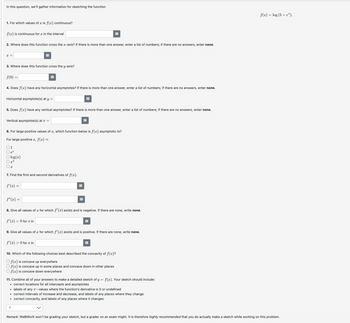
Algebra: Structure And Method, Book 1
(REV)00 Edition Edition
ISBN: 9780395977224
Author: Richard G. Brown, Mary P. Dolciani, Robert H. Sorgenfrey, William L. Cole
Publisher: McDougal Littell
expand_more
expand_more
format_list_bulleted
Question
solve it

Transcribed Image Text:In this question, we'll gather information for sketching the function
1. For which values of a is f(x) continuous?
f(x) is continuous for a in the interval
2. Where does this function cross the x-axis? If there is more than one answer, enter a list of numbers; if there are no answers, enter none.
x =
3. Where does this function cross the y-axis?
f(0) =
4. Does f(x) have any horizontal asymptotes? If there is more than one answer, enter a list of numbers; if there are no answers, enter none.
Horizontal asymptote(s) at y =
5. Does f(x) have any vertical asymptotes? If there is more than one answer, enter a list of numbers; if there are no answers, enter none.
Vertical asymptote(s) at x =
6. For large positive values of x, which function below is f(x) asymptotic to?
For large positive x, f(x) =
○1
○ ea
○ log(2)
Ox
7. Find the first and second derivatives of f(x).
f'(x) =
f" (x) =
#
8. Give all values of x for which f'(x) exists and is negative. If there are none, write none.
f'(x) < 0 for x in
9. Give all values of a for which f'(x) exists and is positive. If there are none, write none.
f'(x) > 0 for x in
B
10. Which of the following choices best described the concavity of f(x)?
Of(x) is concave up everywhere
Of(x) is concave up in some places and concave down in other places
Of(x) is concave down everywhere
11. Combine all of your answers to make a detailed sketch of y = f(x). Your sketch should include:
⚫ correct locations for all intercepts and asymptotes
• labels of any x-values where the function's derivative is 0 or undefined
⚫ correct intervals of increase and decrease, and labels of any places where they change
⚫ correct concavity, and labels of any places where it changes
?
f(x) = log (5+ e*).
Remark: WeBWorK won't be grading your sketch, but a grader on an exam might. It is therefore highly recommended that you do actually make a sketch while working on this problem.
Expert Solution
This question has been solved!
Explore an expertly crafted, step-by-step solution for a thorough understanding of key concepts.
Step by stepSolved in 2 steps

Knowledge Booster
Similar questions
- The circumference C of a circle is a function of its radius given by C(r)=2r. Express the radius of a circle as a function of its circumference. Call this function r(C) , Find r(36) and interpret its meaning,arrow_forwardHow do you find the domain for the composition of two functions, fg ?arrow_forwardTo graph the function f, we plot the points (x,) in a coordinate plane. To graph f(x)=x22, we plot the points (x,). So the point (3,) is on the graph of f. The height of the graph of f above the x-axis when x=3 is _______. Complete the table, and sketch a graph of f. x f(x) (x,y) 2 1 0 1 2arrow_forward
arrow_back_ios
arrow_forward_ios
Recommended textbooks for you
 Algebra: Structure And Method, Book 1AlgebraISBN:9780395977224Author:Richard G. Brown, Mary P. Dolciani, Robert H. Sorgenfrey, William L. ColePublisher:McDougal Littell
Algebra: Structure And Method, Book 1AlgebraISBN:9780395977224Author:Richard G. Brown, Mary P. Dolciani, Robert H. Sorgenfrey, William L. ColePublisher:McDougal Littell Glencoe Algebra 1, Student Edition, 9780079039897...AlgebraISBN:9780079039897Author:CarterPublisher:McGraw Hill
Glencoe Algebra 1, Student Edition, 9780079039897...AlgebraISBN:9780079039897Author:CarterPublisher:McGraw Hill

 Big Ideas Math A Bridge To Success Algebra 1: Stu...AlgebraISBN:9781680331141Author:HOUGHTON MIFFLIN HARCOURTPublisher:Houghton Mifflin Harcourt
Big Ideas Math A Bridge To Success Algebra 1: Stu...AlgebraISBN:9781680331141Author:HOUGHTON MIFFLIN HARCOURTPublisher:Houghton Mifflin Harcourt Holt Mcdougal Larson Pre-algebra: Student Edition...AlgebraISBN:9780547587776Author:HOLT MCDOUGALPublisher:HOLT MCDOUGAL
Holt Mcdougal Larson Pre-algebra: Student Edition...AlgebraISBN:9780547587776Author:HOLT MCDOUGALPublisher:HOLT MCDOUGAL

Algebra: Structure And Method, Book 1
Algebra
ISBN:9780395977224
Author:Richard G. Brown, Mary P. Dolciani, Robert H. Sorgenfrey, William L. Cole
Publisher:McDougal Littell

Glencoe Algebra 1, Student Edition, 9780079039897...
Algebra
ISBN:9780079039897
Author:Carter
Publisher:McGraw Hill



Big Ideas Math A Bridge To Success Algebra 1: Stu...
Algebra
ISBN:9781680331141
Author:HOUGHTON MIFFLIN HARCOURT
Publisher:Houghton Mifflin Harcourt

Holt Mcdougal Larson Pre-algebra: Student Edition...
Algebra
ISBN:9780547587776
Author:HOLT MCDOUGAL
Publisher:HOLT MCDOUGAL